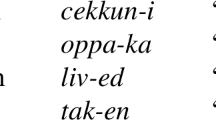Abstract
Minimalist Grammars provide a useful tool for modeling natural language syntax by defining grammar fragments in a very precise way. As a formalization of the Minimalist Program, they can accommodate linguistic analyses from the field of generative syntax. However, they have no machinery for encoding agreement; while morphology can be simulated by multiplying lexical items, there is no systematic way to state generalizations and implement actual proposals. This paper extends Minimalist Grammars with morphological features and operations on them. As a proof of concept, I show how Icelandic dative intervention can be encoded in the modified formalism.
Access this chapter
Tax calculation will be finalised at checkout
Purchases are for personal use only
Similar content being viewed by others
Notes
- 1.
For the sake of exposition, I assume that case assignment reduces to agreement and that structural case is explicitly assigned by finite verbs. Neither is free of controversy.
- 2.
Angle brackets are used to denote tuples. For any n-tuple or sequence, for \(1\le i\le n\), T[i] denotes the ith component of T. The (finite) product of sets \(A_1,A_2,...,A_n\) \(A_1\times A_2\times ...\times A_n = \{\langle a_1,a_2,...,a_n\rangle \ |\ a_1\in A_1,a_2\in A_2,...,a_n\in A_n\}\). Similarly, their concatenation \(A_1A_2...A_n = \{a_1a_2...a_n\ |\ a_1\in A_1,a_2\in A_2,...,a_n\in A_n\}\).
- 3.
The SMC (Shortest Move Constraint): is a special case of the requirement that at any given step in the derivation the derived structure contain only finitely many subtrees (chains) which are syntactically active (i.e. have unchecked features).
- 4.
A lexical item may transmit different values of the same morphological feature via different channels. Moreover, these values need not be a subset of values in the item’s own bundle. Keeping the content of emitting channels unconstrained is useful: for example, a preposition is allowed to transmit lexical case to its complement without morphologically manifesting it itself.
- 5.
If movement is viewed as copying, it is not immediately clear why this should be the case. A system where moving subtrees retain their relation to the original position would be interesting to explore but falls outside the scope of this paper.
- 6.
For space reasons, DPs and small clauses are treated as atomic units. They can be decomposed to model internal agreement in detail. In particular, it is possible to embed DPs within another functional projection, connecting intervention and case (cf. [14], i.a.); this would allow the verb to assign dative to its argument and manipulate the agreement properties of its outer layer at the same time.
- 7.
These items support partial derivations up to T, where morphological dependencies are resolved. Assuming that expletives are merged above TP and move to the specifier of CP [3], the following addition enables full CP derivations of (1)–(3):

References
Adger, D.: A minimalist theory of feature structure. In: Features: Perspectives on a Key Notion in Linguistics, pp. 185–218 (2010)
Bošković, Ž.: On successive cyclic movement and the freezing effect of feature checking. In: Hartmann, J., Hegedüs, V., van Riemsdijk, H. (eds.) Sounds of Silence: Empty Elements in Syntax and Phonology. Elsevier North Holland, Amsterdam (in press)
Bowers, J.: Transitivity. Linguist. Inquiry 33(2), 183–224 (2002)
Chomsky, N.: The Minimalist Program. MIT Press, Cambridge (1995)
Chomsky, N.: Minimalist inquiries: the framework. In: Martin, R., Michaels, D., Uriagereka, J. (eds.) Step by Step: Essays on Minimalist Syntax in Honor of Howard Lasnik, pp. 89–156. MIT Press, Cambridge (2000)
Ermolaeva, M., Edmiston, D.: Distributed morphology over strings. Poster presented at PLC 41, Philadelphia (2017)
Frampton, J., Gutmann, S.: Agreement is Feature Sharing (2000, unpublished manuscript)
Graf, T.: Local and transderivational constraints in syntax and semantics. Ph.D. thesis, UCLA (2013)
Halle, M., Marantz, A.: Distributed morphology and the pieces of inflection. In: Hale, K., Keyser, S. (eds.) The View from Building 20, pp. 111–176. The MIT Press, Cambridge (1993)
Holmberg, A., Hróarsdóttir, T.: Agreement and movement in Icelandic raising constructions. Lingua 114(5), 651–673 (2004)
Kobele, G.M.: Generating copies: an investigation into structural identity in language and grammar. Ph.D. thesis, UCLA (2006)
Kobele, G.M.: A derivational approach to phrasal spellout. Slides presented at BCGL 7 (2012)
Kučerová, I.: Long-distance agreement in Icelandic: locality restored. J. Comp. German. Linguist. 19(1), 49–74 (2016)
Rezac, M.: Phi-agree and theta-related case. In: Harbour, D., Adger, D., Bejar, S. (eds.) Phi Theory: Phi Features across Modules and Interfaces, pp. 83–130. The MIT Press, Cambridge (2008)
Shieber, S.M.: An Introduction to Unification-based Approaches to Grammar. CSLI Lecture Notes. CSLI, Stanford (1986)
Stabler, E.: Derivational minimalism. In: Retoré, C. (ed.) LACL 1996. LNCS, vol. 1328, pp. 68–95. Springer, Heidelberg (1997). https://doi.org/10.1007/BFb0052152
Stabler, E.P.: Recognizing head movement. In: de Groote, P., Morrill, G., Retoré, C. (eds.) LACL 2001. LNCS (LNAI), vol. 2099, pp. 245–260. Springer, Heidelberg (2001). https://doi.org/10.1007/3-540-48199-0_15
Stabler, E.P.: Computational perspectives on minimalism. In: Boeckx, C. (ed.) Oxford Handbook of Linguistic Minimalism, pp. 617–643. Oxford University Press, Oxford (2011)
Trommer, J.: Morphology consuming syntax’ resources: generation and parsing in a minimalist version of distributed morphology. In: Proceedings of the ESSLI Workshop on Resource Logics and Minimalist Grammars (1999)
Acknowledgments
My thanks to Karlos Arregi and Greg Kobele for their advice regarding both the linguistic and the formal aspects of this paper, and to the anonymous reviewers for their helpful comments and suggestions.
Author information
Authors and Affiliations
Corresponding author
Editor information
Editors and Affiliations
Rights and permissions
Copyright information
© 2018 Springer-Verlag GmbH Germany
About this paper
Cite this paper
Ermolaeva, M. (2018). Morphological Agreement in Minimalist Grammars. In: Foret, A., Muskens, R., Pogodalla, S. (eds) Formal Grammar . FG 2017. Lecture Notes in Computer Science(), vol 10686. Springer, Berlin, Heidelberg. https://doi.org/10.1007/978-3-662-56343-4_2
Download citation
DOI: https://doi.org/10.1007/978-3-662-56343-4_2
Published:
Publisher Name: Springer, Berlin, Heidelberg
Print ISBN: 978-3-662-56342-7
Online ISBN: 978-3-662-56343-4
eBook Packages: Computer ScienceComputer Science (R0)





